TEUTON lrEltit
Page 31
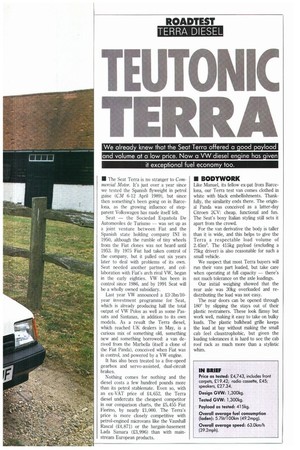
Page 32
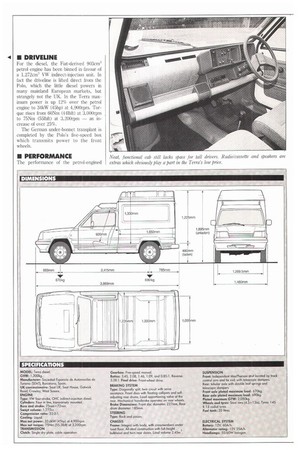
Page 33
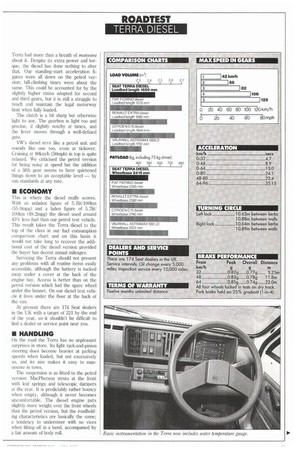
Page 34
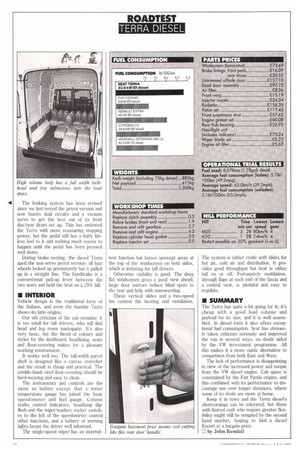
Page 36
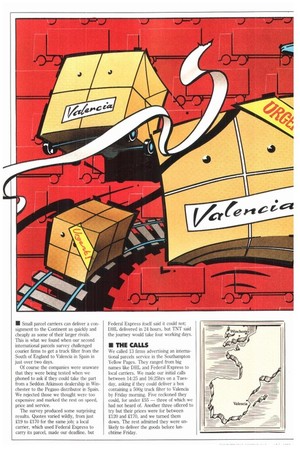
Page 37
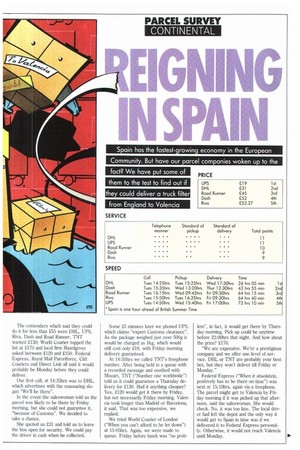
Page 38
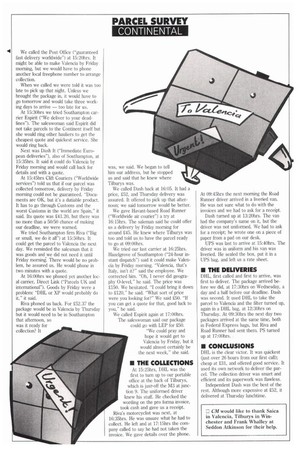
If you've noticed an error in this article please click here to report it so we can fix it.
We alread knew that the Seat Terra offered a •ood ea load and volume at a low .rice. Now a VW diesel en sine has .iven it exce.tional fuel econom too.
• The Seat Terra is no stranger to Commercial Motor. It's just over a year since we tested the Spanish flyweight in petrol guise (CM 6-12 April 1989), but since then something's been going on in Barcelona, as the growing influence of stepparent Volkswagen has made itself felt.
Seat — the Sociedad Espanola De Automoviles de Turismo — was set up as a joint venture between Fiat and the Spanish state holding company [NE in 1950, although the rumble of tiny wheels from the Fiat clones was not heard until 1953. By 1975 Fiat had taken control of the company, but it pulled out six years later to deal with problems of its own. Seat needed another partner, and collaboration with Fiat's arch rival VW, began in the early eighties. VW has been in control since 1986, and by 1991 Seat will be a wholly owned subsidiary.
Last year VW announced a E3.3bn/10year investment programme for Seat, which is already producing half the total output of VW Polos as well as some Passats and Santanas, in addition to its own models. As a result the Terra diesel, which reached UK dealers in May, is a curious mix of something old, something new and something borrowed: a van derived from the Marbella (itself a clone of the Fiat Panda), conceived when Fiat was in control, and powered by a VW engine.
It has also been treated to a five-speed gearbox and servo-assisted, dual-circuit brakes.
Nothing comes for nothing and the diesel costs a few hundred pounds more than its petrol stablemate. Even so, with an ex-VAT price of £4,652, the Terra diesel undercuts the cheapest competitor in our comparison charts, the £.5,455 Fiat Fiorino, by nearly £1,000. The Terra's price is more closely competitive with petrol-engined microvans like the Vauxhall Rascal (£4,871) or the bargain-basement Lada Samara (k3,996) than with mainstream European products.
• BODYWORK
Like Manuel, its fellow ex-pat from Barcelona, our Terra test van comes clothed in white with black embellishments. Thankfully, the similarity ends there. The original Panda was conceived as a latter-day Citroen 2CV: cheap, functional and fun. The Seat's boxy Italian styling still sets it apart from the crowd.
For the van derivative the body is taller than it is wide, and this helps to give the Terra a respectable load volume of 2.45m3. The 415kg payload (excluding a 75kg driver) is also reasonable for such a small vehicle.
We suspect that most Terra buyers will run their vans part loaded, but take care when operating at full capacity — there's not much tolerance on the axle loadings.
Our initial weighing showed that the rear axle was 30kg overloaded and redistributing the load was not easy.
The rear doors can be opened through 180° by slipping the stays out of their plastic restrainers. These look flimsy but work well, making it easy to take on bulky loads. The plastic bulkhead grille keeps the load at bay without making the small cab feel claustrophobic, but given the loading tolerances it is hard to see the cab roof rack as much more than a stylistic whim.
• DRIVELINE
For the diesel, the Fiat-derived 903cm3 petrol engine has been binned in favour of 1,272cm3 VW indirect-injection unit. In fact the driveline is lifted direct from the Polo, which the little diesel powers in many mainland European markets, but strangely not the UK. In the Terra maximum power is up 12% over the petrol engine to 34kW (45hp) at 4,900rprn. Torque rises from 60Nm (44lbft) at 3,000rpm to 75Nm (551bft) at 3,200rpm — an increase of over 25%.
The German under-bonnet transplant is completed by the Polo's five-speed box which transmits power to the front wheels.
• PERFORMANCE
The performance of the petrol-engined
Terra had more than a breath of manyana about it. Despite its extra power and torque, the diesel has done nothing to alter that. Our standing-start acceleration figures were all down on the petrol version; hill-climbing times were about the same. This could be accounted for by the slightly higher ratios adopted for second and third gears, but it is still a struggle to reach and maintain the legal motorway limit vehen fully loaded.
The clutch is a bit sharp but otherwise light to use. The gearbox is light too and precise, if slightly notchy at times, and the lever moves through a well-defined gate.
VW's diesel revs like a petrol unit and sounds like one too, even at tickover. Cruising at 80krn/h (50mph) in top is quite relaxed. We criticised the petrol version for being noisy at speed but the addition of a fifth gear seems to have quietened things down to an acceptable level — by van standards at any rate.
• ECONOMY
This is where the diesel really scores. With an unladen figure of 5.11it/100km (55.0mpg) and a laden figure of 5.7Iiti 100km (49.2mpg) the diesel used around 45% less fuel than our petrol test vehicle. This result takes the Terra diesel to the top of the class in our fuel consumption comparison chart and on this basis it would not take long to recover the additional cost of the diesel version provided the buyer has decent annual mileages.
Servicing the Terra should not present any problems with all routine items easily accessible, although the battery is tucked away under a cover at the back of the engine bay. Access is better than on the petrol version which had the spare wheel under the bonnet. On our diesel test vehicle it lives under the floor at the back of the van.
At present there are 174 Seat dealers in the UK with a target of 221 by the end of the year, so it shouldn't be difficult to find a dealer or service point near you.
• HANDLING
On the road the Terra has no unpleasant surprises in store. Its light rack-and-pinion steering does become heavier at parking speeds when loaded, but not excessively so, and its size makes it easy to manoeuvre in town.
The suspension is as fitted to the petrol version: MacPherson struts at the front with leaf springs and telescopic. dampers at the rear. It is predictably rather bouncy when empty, although it never becomes uncomfortable. The diesel engine puts slightly more weight over the front wheels than the petrol version, but the roadholding characteristics are basically the same; a tendency to understeer with no vices when lifting off in a bend, accompanied by a fair amount of body roll.
The braking system has been revised since we last tested the petrol version and now boasts dual circuits and a vacuum servo to get the best out of its front disc/rear drum set up. This has endowed the Terra with more reassuring stopping power, but the pedal still has a fairly lifeless feel to it and nothing much seems to happen until the pedal has been pressed well down.
During brake-testing, the diesel Terra aped the non-servo petrol version: all four wheels locked up prematurely but it pulled up in a straight line. The handbrake is a conventional pull-up lever between the two seats and held the Seat on a 25% hill.
• INTERIOR
Vehicle design is the traditional forte of the Italians, and even the humble Terra shows its latin origins.
Our old criticism of the cab remains: it is too small for tall drivers, who will find head and leg room inadequate. It's also very basic, but the blend of colours and styles for the dashboard, headlining, seats and floor-covering makes for a pleasant working environment.
It works well too. The full-width parcel shelf is designed like a canvas stretcher and the result is cheap and practical The crinkle-finish vinyl floor-covering should be hard-wearing and easy to clean.
The instruments and controls are the same as before except that a water temperature gauge has joined the basic speedometer and fuel gauge. Column stalks control indicators, headlamp dip/ flash and the wiper/washer; rocker switches to the left of the speedometer control other functions, and a battery of warning lights keeps the driver well informed.
The single-speed wiper has an intermit tent function but leaves uns wept areas at the top of the windscreen on both sides, which is irritating for tall drivers.
Otherwise visibility is good. The deep flat windscreen gives a good view ahead; large door mirrors reduce blind spots to the rear and help with manoeuvring.
Three vertical slides and a two-speed fan control the heating and ventilation. The system is rather crude with slides for hot air, cold air and distribution. It provides good throughput but heat is either full on or off. Fortunately ventilation,. through flaps at each end of the fascia and a central vent, is plentiful and easy to regulate.
• SUMMARY
The Terra has quite a lot going for it; it's cheap with a good load volume and payload for its size, and it is well assembled. In diesel form it also offers exceptional fuel consumption. Seat has obviously taken criticism seriously and improved the van in several ways, no doubt aided by the VW investment programme. All this makes it a more viable alternative to competition from both East and West.
The lack of performance is disappointing in view of the increased power and torque. from the VW diesel engine. Cab space is constrained by the Fiat Panda origins, and this combined with its performance to discourage use over longer distances, where some of its rivals are more at home.
Keep it in town and the 'rerra diesel's shortcomings can be tolerated, but those with limited cash who require greater flexibility might still be tempted by the second hand market, hoping to find a diesel Escort at a bargain price.
E by John Kendall
• Small parcel carriers can deliver a consignment to the Continent as quickly and cheaply as some of their larger rivals. This is what we found when our second international parcels survey challenged courier firms to get a truck filter from the South of England to Valencia in Spain in just over two days.
Of course the companies were unaware that they were being tested when we phoned to ask if they could take the part from a Seddon Atkinson dealership in Winchester to the Pegaso distributor in Spain. We rejected those we thought were too expensive and marked the rest on speed, price and service.
The survey produced some surprising results. Quotes varied wildly, from just 219 to £170 for the same job; a local carrier, which used Federal Express to carry its parcel, made our deadline, but Federal Express itself said it could not; DHL delivered in 24 hours, but TNT said the journey would take four working days.
• THE CALLS
We called 13 firms advertising an international parcels service in the Southampton Yellow Pages. They ranged from big names like DHL and Federal Express to local carriers. We made our initial calls between 14:25 and 16:25hrs on a Tuesday, asking if they could deliver a box containing a 500g truck filter to Valencia by Friday morning. Five reckoned they could, for under 255 — three of which we had not heard of. Another three offered to try but their prices were for between £120 and 2170, and we turned them down. The rest admitted they were unlikely to deliver the goods before lunchtime Friday. The contenders which said they could do it for less than 255 were DHL, UPS, Riva, Dash and Road Runner. TNT wanted 2130; World Courier topped the list at 2170 and local firm Hazelgrove asked between £120 and 2150. Federal Express, Royal Mail Parcelforce, Chit Couriers and Direct Link all said it would probably be Monday before they could deliver.
Our first call, at 14:25hrs was to DHL, which advertises with the reassuring slogan "We'll be there".
In the event the saleswoman told us the parcel was likely to be there by Friday morning, but she could not guarantee it, "because of Customs". We decided to take a chance.
She quoted us 231 and told us to leave the box open for security. We could pay the driver in cash when he collected.
Some 25 minutes later we phoned UPS, which claims "expert Customs clearance". As the package weighed just over 500g it would be charged as lkg, which would still cost only 219, with Friday morning delivery guaranteed.
At 14:55hrs we called TNT's freephone number. After being held in a queue with a recorded message and soothed with Mozart, TNT ("Number one worldwide") told us it could guarantee a Thursday delivery for 2130. Had it anything cheaper? Yes, 2120 would get it there by Friday, but not necessarily Friday morning. Valencia took longer than Madrid or Barcelona, it said. That was too expensive, we replied.
We tried World Courier of London ("When you can't afford to be let down") at 15.05hrs. Again, we were made to queue. Friday before lunch was "no prob
lem", in fact, it would get there by Thursday morning. Pick up could be anytime before 22:00hrs that night. And how about the price? 2170.
"We are expensive. We're a prestigious company and we offer one level of service. DHL or TNT are probably your best bet, but they won't deliver till Friday or Monday."
Federal Express ("When it absolutely, positively has to be there on time") was next at 15:10hrs, again via a freephone. The parcel might get to Valencia by Friday morning if it was picked up that afternoon, said the saleswoman. She would check. No, it was too late. The local driver had left the depot and the only way it would get to Spain in time was if we delivered it to Federal Express personally. Otherwise, it would not reach Valencia until Monday_ We called the Post Office ("guaranteed fast delivery worldwide") at 15:20hrs. It might be able to make Valencia by Friday morning, but we would have to phone another local freephone number to arrange collection.
When we called we were told it was too late to pick up that night. Unless we brought the package in, it would have to go tomorrow and would take three working days to arrive — too late for us.
At 15:30hrs we tried Southampton carrier Espirit ("We deliver to your deadlines"). The saleswoman said Espirit did not take parcels to the Continent itself but she would ring other hauliers to get the cheapest quote and quickest service. She would ring back.
Next was Dash It ("Immediate European deliveries"), also of Southampton, at 15:35hrs. It said it could do Valencia by Friday morning and would call back for details and with a quote. At 15:45hrs Clift Couriers ("Worldwide services") told us that if our parcel was collected tomorrow, delivery by Friday morning could not be guaranteed. "Documents are OK, but it's a dutiable product. It has to go through Customs and the worst Customs in the world are Spain," it said. Its quote was 241.20, but there was no more than a 50/50 chance of making our deadline, we were warned.
We tried Southampton firm Riva ("Big or small, we do it all") at 15:50hrs. It could get the parcel to Valencia the next day. We reminded the salesman that it was goods and we did not need it until Friday morning. There would be no problem, he assured us. He would phone in two minutes with a quote.
At 16:00hrs we phoned yet another local carrier, Direct Link ("Parcels UK and international"). Goods by Friday were a problem: "DHL or XP would probably do it," it said.
Riva phoned us back. For 252.37 the package would be in Valencia by Thursday but it would need to be in Southampton that afternoon, so was it ready for collection? It was, we said. We began to tell him our address, but he stopped us and said that he knew where Tilburys was.
We called Dash back at 16:05. It had a price, £52, and Thursday delivery was assured. It offered to pick up that afternoon; we said tomorrow would be better.
We gave Havant-based Road Runner ("Worldwide air courier") a try at 16:15hrs. The saleman said he could offer us a delivery by Friday morning for around £45. He knew where Tilburys was too and told us,to have the parcel ready to go at 09:00hrs.
We tried our last carrier at 16:25hrs. Hazelgrove of Southampton ("24-hour instant dispatch") said it could make Valencia by Friday morning. "Valencia, that's Italy, isn't it?" said the employee. We corrected him. "Oh, I never did geography 0-level," he said. The price was £150. We hesitated. "I could bring it down to £120," he said. "What sort of price were you looking for?" We said £50. "If you can get a quote for that, good luck to you," he said.
We called Espirit again at 17:00hrs. The saleswoman said our package could go with LEP for £50. "We could pray and hope it would get to Valencia by Friday, but it would almost certainly be the next week," she said.
• THE COLLECTIONS
At 15:25hrs, DHL was the first to turn up to our portable office at the back of Tilburys, which is just' off the M3 at junc tion 9. The uniformed driver knew his stuff. He checked the wording on the pro forma invoice, took cash and gave us a receipt.
Riva's motorcyclist was next, at 16:35hrs. He was unsure what he had to collect. He left and at 17:15hrs the company called to say he had not taken the invoice. We gave details over the phone. At 09:45hrs the next morning the Road Runner driver arrived in a liveried van. He was not sure what to do with the invoices and we had to ask for a receipt.
Dash turned up at 13:20tu-s. The van had the company's name on it, but the driver was not uniformed. We had to ask for a receipt; he wrote one on a piece of paper from a pad on our desk.
UPS was last to arrive at 15:40hrs. The driver was in uniform and his van was liveried. He sealed the box, put it in a UPS bag, and left us a rate sheet.
• THE DELIVERIES
DHL, first called and first to arrive, was first to deliver. The package arrived before we did, at 17:30hrs on Wednesday, a day and a half before our deadline. Dash was second. It used DHL to take the parcel to Valencia and the filter turned up, again in a DHL bag, at 12:30hrs on Thursday. At 09:30Iu-s the next day two packages arrived at the same time, both in Federal Express bags, but Riva and Road Runner had sent them. PS turned up at 17:00hrs.
• CONCLUSIONS
DHL is the clear victor. It was quickest (just over 26 hours from our first call); cheap at £31, and offered good service. It used its own network to deliver the parcel. The collection driver was smart and efficient and its paperwork was flawless.
Independent Dash was the best of the rest. Although more expensive at £52, it delivered at Thursday lunchtime.




























































































